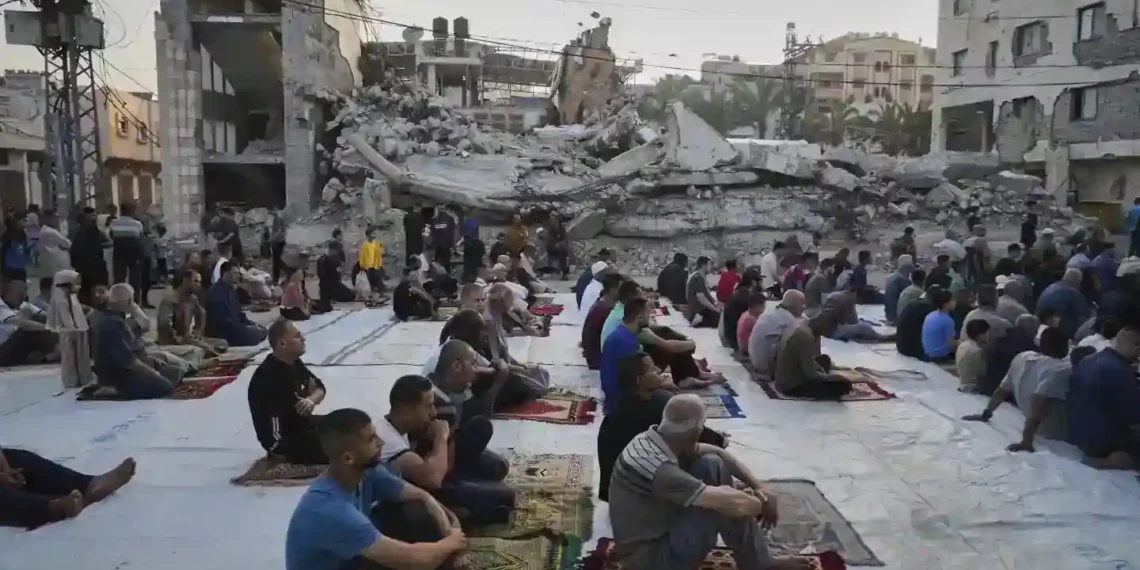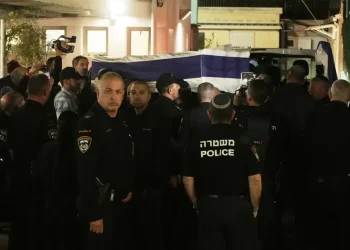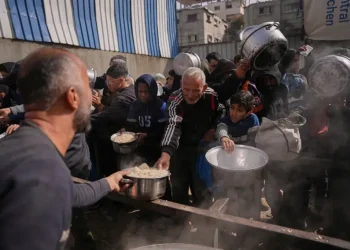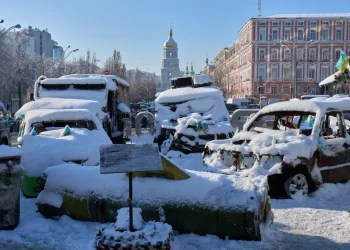Gaza Marks Eid Amid Devastation and Growing Hunger
DEIR AL-BALAH, Gaza Strip — As the sun rose over the war-torn Gaza Strip, Palestinians gathered for Eid al-Adha prayers—not in grand mosques or homes, but in the open air among the rubble. For many, this was a harsh reminder of the conflict’s toll, as food grows scarcer and hope for peace remains distant.
“This is the worst Eid the Palestinian people have ever faced,” said Kamel Emran, who attended prayers in Khan Younis. “No food, no flour, no shelter, no mosques, no homes, no mattresses… The conditions are very, very harsh.”
Prayers Among Ruins, Memories of Loss
Eid al-Adha, one of Islam’s holiest holidays, traditionally brings families together to celebrate and share meals. But this year in Gaza, the usual joy was overshadowed by loss and hardship.
In Gaza City, Sanaa Al-Ghola stood tearfully in the ruins of a cemetery near a half-collapsed mosque. She had come to pray for her son, Mohamed al-Ghoul, who was killed last month during shelling while fetching flour. “We lost everything—our home, money, and my son,” she said, holding a photo of Mohamed. “There is no more Eid after you’re gone.”
At a displacement camp in Muwasi, Tahrir Abu Jazar warmed leftover lentils for her five children. “There are no celebrations now—no new clothes, no sacrificial meat, no gifts, no joy,” she said. Her son, trying to find normalcy, was scared away by warplanes.
Violence and Aid Challenges Continue
In Rafah, the grim reality of the conflict played out anew as nine people were killed while trying to collect humanitarian aid. Eight died from gunshot wounds, and one from shrapnel, according to hospital officials. Israel’s military has not confirmed these reports but is investigating.
A newly formed group, the Gaza Humanitarian Foundation (GHF), denied any violence at aid points, stating distributions were “peaceful and without incident.” However, the ongoing violence and movement restrictions make aid delivery a daily struggle.
Israel warned civilians in northern Gaza of upcoming military operations after rockets were fired toward Israel from that area. Meanwhile, four Israeli soldiers were killed in a blast while searching a Hamas compound in Khan Younis, highlighting the continuing dangers on both sides.
A Devastating Toll Since October 7
The war erupted on October 7, 2023, when Hamas militants launched a deadly surprise attack on Israel, killing about 1,200 people and abducting 251 hostages. Israeli forces have since killed over 54,000 Palestinians—mostly civilians—and displaced roughly 90% of Gaza’s 2 million residents, according to Gaza’s Health Ministry.
The offensive has left large parts of Gaza in ruins, forcing families into displacement and desperate conditions.
Risk of Famine Looms Over Gaza
After months of a near-total blockade, Israel has recently allowed limited food and aid into Gaza. Yet, the United Nations reports that much of this aid remains undelivered due to military restrictions and unsafe roads.
The Food and Agriculture Organization (FAO) warns that by September, nearly half a million Gazans could face severe food insecurity—pushing the territory toward famine.
Rein Paulson of the FAO described the crisis starkly: “The risk of famine is really touching the whole Gaza Strip.”
Aid Distribution Under Fire
Tensions around aid distribution sites remain high. Frequent shootings near distribution points have led to more than 80 deaths in recent weeks, with Israeli troops and Palestinians clashing over access.
Israel accuses Hamas of interfering with aid efforts, while Palestinian hospitals report deaths caused by soldiers firing at crowds. In response to dangerous crowding, the Gaza Humanitarian Foundation temporarily paused aid distribution, later clarifying it was a short-term safety measure.
The Israeli military announced new rules limiting access to aid sites strictly between 6 a.m. and 6 p.m., designating other times as closed military zones.
Controversy Hits U.S. Consulting Firm Involved in Gaza Aid
Adding to the turmoil, the Boston Consulting Group confirmed it had dismissed two partners for undisclosed work related to the GHF’s food distribution efforts in Gaza. The firm is continuing its investigation.
The Human Face of a Conflict Without End
As Gaza endures this brutal conflict, the Eid prayers in the rubble, the shrinking food supplies, and the stories of families torn apart by violence remind the world of the human cost behind the headlines. For many Palestinians, this Eid was not about celebration—but survival.
This article was rewritten by JournosNews.com based on verified reporting from trusted sources. The content has been independently reviewed, fact-checked, and edited for accuracy, neutrality, tone, and global readability in accordance with Google News and AdSense standards.
All opinions, quotes, or statements from contributors, experts, or sourced organizations do not necessarily reflect the views of JournosNews.com. JournosNews.com maintains full editorial independence from any external funders, sponsors, or organizations.
Stay informed with JournosNews.com — your trusted source for verified global reporting and in-depth analysis. Follow us on Google News, BlueSky, and X for real-time updates.













